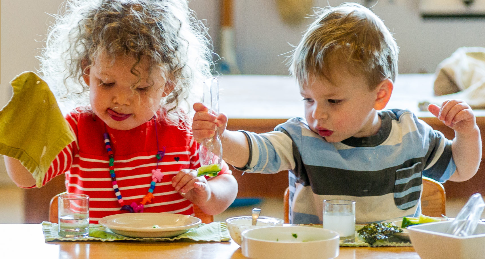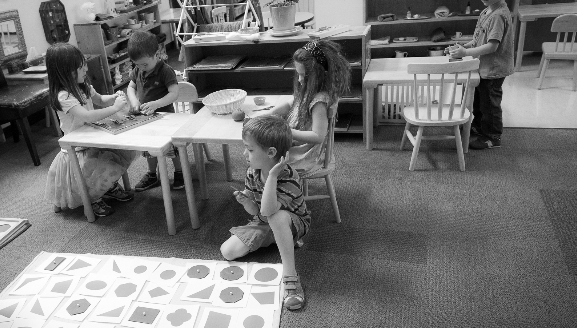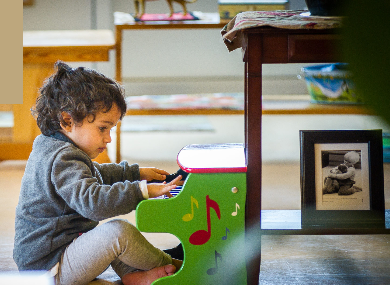
October 24, 2022
Preaching to the choir
A persuasive tone in speech and writing lends an urgent and important feeling to any topic. Then again, talking or writing persuasively about the benefits of Montessori education before an audience of parents whose children are thriving in Montessori classrooms is a little silly. Parents who attend school meetings and read blog posts are among the best. They are typically people who are already thoughtfully engaged in education and parenting.
At every parent meeting, teachers look out into an audience of familiar faces. We notice that the same people also volunteer, ask honest questions in parent-teacher conferences, participate in fund-raisers, and arrive at school on time. We look for their faces in our audiences because the smiles are reassuring, and also because we know our words will make an immediate and lasting difference in the lives of their children. It’s a grand exchange but asking “Why Montessori?” is a risk. Redundancy is boring, and smart people do not like to be bored.
My response to the “Why Montessori?” question is not detailed or exhaustive. It is a broad-strokes personal narrative, loaded with opinions formed in more than two decades of teaching. The arrangements of space, time, and people that I consider essential to an authentic Montessori education are not doctrinal. Others would answer the same question differently, but accurately.
I could easily add to the following list, but I could not take anything away.

Diversity
The youngest Montessori students gather information through observation and admiration of their older classmates. The oldest students are challenged and often transformed by urgent demands to help and guide their younger peers.
The failure of most public and private schools to incorporate diversity into the formation of classrooms and curriculums has been widely reported. It is an old and persistent problem. The segregation of ages and the standardization of curriculum is a lost opportunity. Standardization and segregation are huge limitations to academic achievement, and to the growth of human understanding.
There are children learning in Montessori classrooms from a kaleidoscopic array of ethnic, religious, and socio-economic backgrounds. They learn as much from each other as they do from formal lessons. Geographically isolated Montessori classrooms can be more homogenous than a school located in a diversely populated urban area, but every authentic Montessori school has a student population of mixed ages and abilities. Montessori students are not differentiated by age or intellect.
This diversity is, in my opinion, the single factor that has the most profound and lasting impact on the education of young children. Montessori students demonstrate how much we have to learn from each other as well as how much each of us has to offer our world.
Prepared Environment
Furniture in Montessori classrooms is the appropriate size for the children who will use it. This is also true of the tools, utensils, and materials they will hold in their hands. Pictures hang on the wall at the level of the student’s eyes. Every classroom is organized in such a way that the sequence of learning is materially present on the shelves and obvious to the children. The goals of independent decision-making and internal motivation are built into the carefully prepared environment.
Montessori classrooms are as different as the teachers who tend them, but they evince an attention to order and beauty rarely witnessed in education. Most are filled with light, plants, fresh flowers, and an ambiance of grace. Environments affect the quality of the experiences within them. The earliest memories of learning are, for Montessori students, forever associated with the warmth and peace of their first classrooms.
Purposeful Work
Maria Montessori was educated and trained as a physician. Throughout her long life, she remained fascinated with her observations of human health. The work she offered her students was always purposeful, and it always involved the coordinated work of mind and body. Montessori understood that a strong mind paired with strong hands led to the optimum development of a child’s intelligence. This was true with her first students, and it remains true today.
Students in Montessori classrooms have daily opportunities to select their work. Children may repeat the tasks they select as often as they desire until the task is mastered. Work was chosen independently and repeated without interruption often leading to deep concentration. Montessori’s ability to cultivate and protect the concentration of young children through their purposeful work remains one of her most significant contributions to the education of young people.
Skilled Leadership
A traditionally structured classroom usually includes a teacher-directed curriculum. Time and space are marked and organized by the strong, clear voice of a teacher who is trained in an age group or an academic discipline, mathematics, for example, four-year-olds, or music.
Montessori classrooms are active, creative, and adaptive communities. The teacher’s voice is seldom heard, and she frequently sits beside a child as he or she learns. It might seem that the hierarchical structure of a traditional classroom would require stronger leadership and stricter discipline. Actually, a healthy Montessori community requires a much more intelligent and intuitive style of leadership.
Montessori teachers must be skilled in the practice of observation and comfortable with the independent, purposeful movement of young minds at work. Nationally and internationally accredited Montessori teacher training courses are intense and demanding. This is as it should be. Montessori teachers should be experts in the abstract principles and concrete materials that structure the life of a classroom.
Silence
Visitors to Montessori classrooms first notice the beauty and order present throughout the environment. They also notice the quiet, especially if they are accustomed to teacher-directed systems of education. There are no bells prompting students to change activities or locations, no intercom, and no video or television instruction. Montessori teachers do gather the entire class for special events, singing, or sharing stories, but the voice of the teacher does not direct the movements of the children throughout the day.

In Montessori classrooms, there are occasions when the classroom is silent when every child in the community is at work. More often, Montessori environments are characterized by the quiet hum of children at work, moving and talking together about subjects that demand their undivided, uninterrupted attention. In a contemporary culture heavily influenced by the interruptions of technology and the distractions of screens, this is a rare and precious gift.
Why Montessori?
If it were possible for a young child to answer “Why Montessori?” in a phrase or sentence that stretched beyond her limited frame of reference and her real gratitude for the fun she had a school that day, she would probably say, “I found myself!” Though their academic accomplishments are remarkable, the greatest achievements of Montessori students are far grander and more lasting.
Montessori students do have a confident, comfortable understanding of the academic concepts they will rely upon for the rest of their lives. They are academically strong not just for the short-term, but for a lifetime of learning. They also have a realistic understanding of their strengths, weaknesses, and talents. They can identify times and places when they should lead, as well as occasions when they should ask for help.
The experience of working in an intelligent community helps children understand both that there are some tasks we must do alone, and that we need each other to achieve our goals. Even our youngest students know how to reach inward and outward. The inner teacher of a healthy Montessori child is more reliable than any methodology or even the guidance of a talented teacher. Our students know how to work toward a goal, how to persevere when challenged, and how to connect in meaningful ways to the people in their home and school communities.
Why Montessori? Because a strong Montessori community is a group of people working together to help each person become the best version of him or herself. The gift of a Montessori classroom is that children begin their education with strong bodies and strong minds working alongside friends who know and love them almost as well as they know themselves.